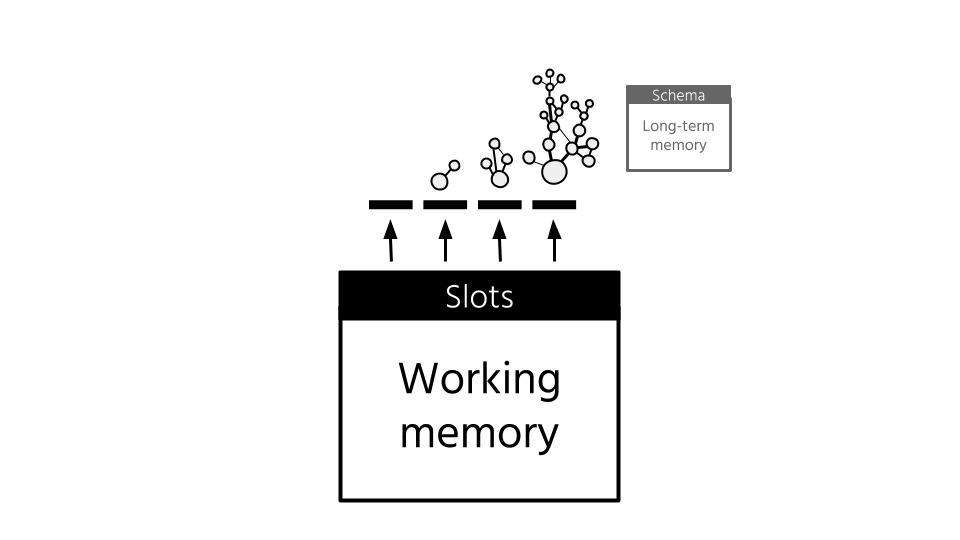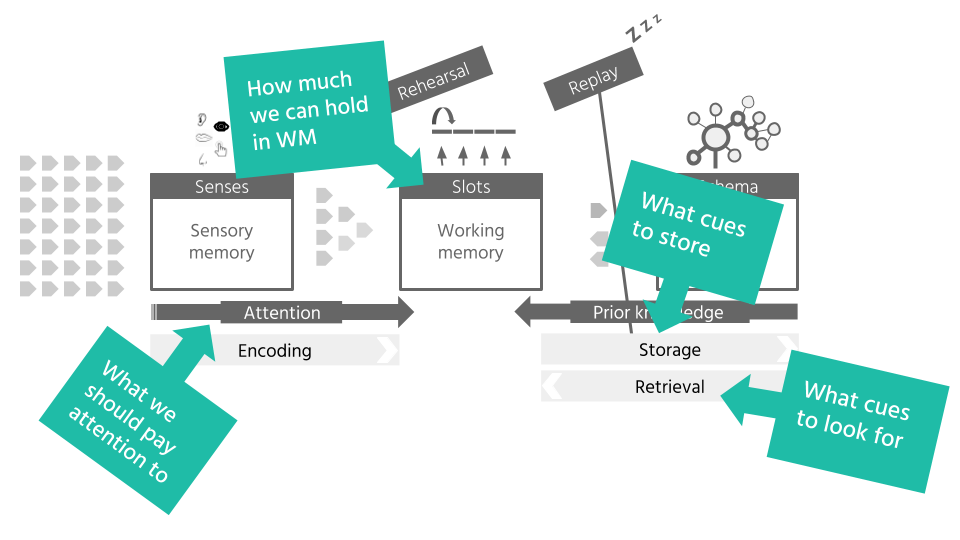15
Prior knowledge can be thought of as “as stored knowledge and beliefs about the world that have been acquired by an individual. This knowledge can be declarative (i.e., semantic, episodic) or non-declarative (e.g., implicit or procedural)” (Brod, Werkle-Bergner & Shing, 2013). As our learning builds on what is already there, our pre-existing or prior knowledge is one of the most significant determinants of subsequent learning (Schneider & Stern, 2010; Little-Johnson, Star & Durkin, 2009). “Storing information in human memory appears to create capacity—that is, opportunities for additional linkages and storage—rather than use it up” (Bjork, Dunlosky & Kornell, 2013). This stored information forms our knowledge base and is thought to be made up of schema (i.e. mental models). If prior knowledge is insufficient, it can disrupt all stages of memory formation – encoding, storage and retrieval.
For example, our existing or prior knowledge helps us determine what to pay attention to and improve the efficacy of what we encode. When we have an experience, we have to identify what is relevant and what is irrelevant. Prior knowledge helps us figure out what is worth paying attention to and what is worth ignoring.
Prior knowledge can enhance our ability to hold, manipulate and store information as it increases our WM capacity (e.g. how much information we can hold in WM). Cognitive load theory suggests that long-term memories such as complex schema occupy one unit in working memory. So, our prior knowledge enables us to hold much more information at once for manipulation. E.g. If our prior knowledge is extensive and automated then the size of the chunks we can form in WM are larger and the more space is left over in WM for processing novel information. (Van Merrienboer & Sweller, 2010).

Further, by activating a complex schema while processing new information, the new information has more potential places to connect to. Finally, prior knowledge helps us retrieve the information we need. This starts at the time of encoding, as with adequate prior knowledge, we are more likely to associate appropriate cues with the stored information – making such learning more likely to be found when needed. Moreover, prior knowledge helps us figure out what retrieval cues to look for in our environment (e.g. context) – so that we know what information to retrieve. Research also suggests that activating existing schema (prior knowledge) can lead to rapid LTM consolidation as “prior knowledge facilitates processing of new incoming information, supposedly because it provides a structure into which the new information can be integrated, which may lead to an elaborated memory trace”(Brod, Werkle-Bergner & Shing, 2013).

The greater our prior knowledge in a domain, the more we can learn from a related experience. The rich get richer in terms of knowledge building. But building prior knowledge requires durable learning – the ability to recall information after time has passed and not just for immediate tests. Scaffolding can help reach students with low levels of prior knowledge. Guiding them to what’s important to pay attention to in the experience and, importantly, what is irrelevant. Support materials that fill in prior knowledge gaps and minimize the amount of novel information to manipulate are examples. Moreover, providing guidance on related concepts (analogies, metaphors, similar contexts) allows students to activate related knowledge and tries to facilitate students in establishing connections to the new learning. As an example, guidance could involve activities that elicit thoughts on future situations or contexts in which the information would be useful. This way students are able to associate relevant cues to what was learned – so that such learning becomes more retrievable in the future.
References
Prior Knowledge Deficits
- Bjork, R. A., Dunlosky, J., & Kornell, N. (2013). Self-regulated learning: Beliefs, techniques, and illusions. Annual review of psychology, 64, 417-444.
- Van Merriënboer, J. J., & Sweller, J. (2010). Cognitive load theory in health professional education: design principles and strategies. Medical education, 44(1), 85-93.
- Schneider, M., & Stern, E. (2010). The cognitive perspective on learning: Ten cornerstone findings. The nature of learning: Using research to inspire practice, 69-90.
- Rittle-Johnson, B., Star, J. R., & Durkin, K. (2009). The importance of prior knowledge when comparing examples: Influences on conceptual and procedural knowledge of equation solving. Journal of Educational Psychology, 101(4), 836.
- Brod, G., Werkle-Bergner, M., & Shing, Y. L. (2013). The influence of prior knowledge on memory: a developmental cognitive neuroscience perspective. Frontiers in behavioral neuroscience, 7, 139.
Media Attributions
- EN Illuminated eBook Graphics (10)
- EN Illuminated eBook Graphics (12)
